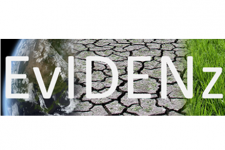Droughts have generally increased in their duration and intensity worldwide over the last centuries. Agricultural land is especially endangered which has direct consequences on food security, health, and the economic situation of a country. The project on Earth Observation-based Information Products for Drought Risk Reduction at the National Level (EvIDENz) develops and tests new Earth Observation-Based methods to monitor drought hazard characteristics using South Africa and Ukraine as case study countries.
Agricultural drought impact monitoring is carried out in this pilot project with space-based sensors in combination with agricultural and census data for the Eastern Cape Province. The EvIDENz Recommended Practice provides an estimate of the number of people affected in the agricultural sector (livestock and crops) due to agricutlural drought hazard.
EvIDENz is based on the realization that international conventions and frameworks feature more and more goals, targets, priorities for actions and indicators which are quantifiable and measurable rather than being of a qualitative nature. This offers new opportunities for Earth observation.
The project aims at developing new methods and appropriate means of communicating Earth observation-based information so that it can be used to meet the requirements of conventions and framework goals, targets and indicators as well as needs by national stakeholders. The project focuses on value adding from sensor data to information to knowledge to informed decision making and implementation.
The project focuses on the Sendai Framework for Disaster Risk Reduction 2015-2030 (SFDRR) for the drought risk reduction case and aims at highlighting synergies to UNFCCC and Agenda 2030 demands. The outcomes of EvIDENz shall enable uptake at the national level providing e.g. risk knowledge (priority for Action 1 in SFDRR) through Earth observation-based agricultural drought hazard monitoring, exposure and vulnerability of the agricultural sector, event-specific yield losses and supporting SFDRR Target B on people affected by droughts and Target C on direct economic losses by droughts in the agricultural sector.
Agricultural drought hazard monitoring at the national level is carried out using a combination of different sensors and is highlighted through the use of the new Sentinel missions of the European Commissions’ Copernicus Program. Sentinel data provide free optical and radar data in high resolution which is an advantage especially for the which generation and use of Earth observation-based information products in low income and low-middle income countries.
These information products will be fused with vulnerability metrics that are developed and quantified based on indicators using mainly socio-economic and statistical data. EvIDENz features two study sites: (1) Eastern Cape Province, South Africa and (2) Kyiv region (oblast) in Ukraine. The study sites have been chosen based on the best availability of necessary data as the project cannot conduct intensive field surveys and the developments need to build on available data, which increase the chances of use at the national level.

Fig: EvIDENz value-adding chain
Risk information products serve as early warning information and provide a key understanding of criteria and characteristics of areas and people at risk in the context of drought events.
The use and transferability of the developed processing chain of drought risk-related information products to other low-income and lower-middle income countries is the project´s overall objective.
The project is carried out by the Center for Remote Sensing of Land Surfaces (ZFL), University of Bonn, the United Nations University Institute for Environment and Human Security (UNU-EHS) and the United Nations Office for Outer Space Affairs (UNOOSA) through its Platform for Space-based Information for Disaster Management and Emergency Response (UN-SPIDER), together with partner organizations in South Africa and Ukraine.
ZFL provides its expertise in applied research and development in the fields of Earth observation, risk research, water management and geomatics. UNU-EHS brings in expertise in socio-economic vulnerability and risk assessments. UN-SPIDER, in its function and expertise to value space research and technology outcomes to requirements in disaster risk management, knowledge provision, and international cooperation, will complement the team.
Related publications:
Walz, Yvonne, Annika Min, Karen Dall, Moses Duguru, Juan-Carlos Villagrán de León, Valerie Graw, Olena Dubovyk, Zita Sebesvari, Andries Jordaan, and Joachim Post (2020). “Monitoring Progress of the Sendai Framework Using a Geospatial Model: The Example of People Affected by Agricultural Droughts in Eastern Cape, South Africa.” Progress in Disaster Science, 5 (January 1, 2020): 100062. https://www.sciencedirect.com/science/article/pii/S2590061719300626?via%3Dihub.
Walz, Yvonne, Karen Dall, Valerie Graw, Juan Carlos Villagrán de León, Susanne Haas, Nataliia Kussul, and Andries Jordaan (2018). "Understanding and reducing agricultural drought risk: Examples from South Africa and Ukraine." UNU-EHS Policy Reports. United Nations University - Institute for Environment and Human Security. https://collections.unu.edu/view/UNU:6688
"Earth Observation-based Information Products for Drought Risk on a National Basis" (EViDENz) is funded by the Federal Ministry for Economic Affairs and Energy (BMWi; grant No 50EE1541).
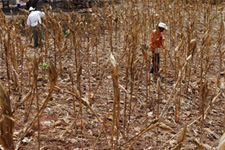 |
Background Information The project focuses on the Sendai Framework for Disaster Risk Reduction 2015-2030 (SFDRR), and technical guidance for monitoring and reporting on progress in achieving the global targets of the Sendai Framework for Disaster Risk Reduction: Target B and Target C. |
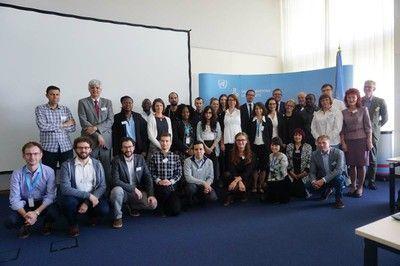 |
News and Advances On this page, we will post the news from institutions in countries where the project is being executed and from the partners. |
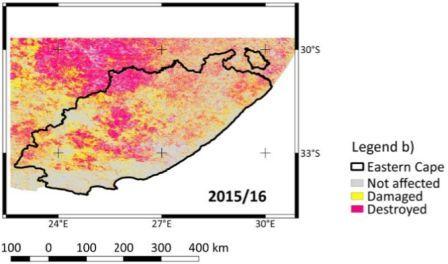 |
Methods and Tools This page presents a suggestion to use space-based data to estimate the impacts of agricultural drought on crops as a way to derive data for Sendai Framework reporting. |
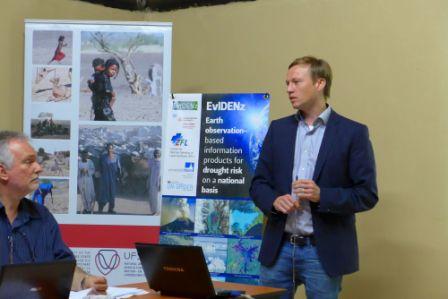 |
Workshops On this page, you will find information on recent and upcoming workshops conducted by the government agencies involved in this project and the partners. |
